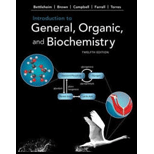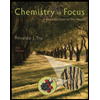
Introduction To General, Organic, And Biochemistry
12th Edition
ISBN: 9781337571357
Author: Frederick A. Bettelheim, William H. Brown, Mary K. Campbell, Shawn O. Farrell, Omar Torres
Publisher: Cengage Learning
expand_more
expand_more
format_list_bulleted
Question
Chapter 24, Problem 84P
Interpretation Introduction
Interpretation: The reason should be explained for how telomerase make a cancer cell immortal.
Concept introduction: Every human being got a genetic makeup that contains about three billion pairs of
At the ends of chromosomes, telomeres are specialized structures as in vertebrates, telomeres carry TTAGGG sequencing repeated n number of times.
Expert Solution & Answer
Want to see the full answer?
Check out a sample textbook solution
Students have asked these similar questions
If the symbol A is placed in a reaction, at what temperature does it take place?
By malonic or acetylacetic synthesis, synthesize 3-methyl-4-oxopentanoic acid (indicate the formulas of the compounds).
oalmitic acid is a 16 carbon acid. In a balanced equation, the products of the sponification of tripalmitin (glyceryl tripalmitate are blank.
Chapter 24 Solutions
Introduction To General, Organic, And Biochemistry
Ch. 24.2 - Problem 25-1 Draw the structure of UMP.Ch. 24.3 - Prob. 24.2QCCh. 24.3 - Prob. 24.3QCCh. 24.4 - Prob. 24.4QCCh. 24.5 - Prob. 24.5QCCh. 24.6 - Prob. 24.6QCCh. 24.7 - Prob. 24.7QCCh. 24.8 - Prob. 24.8QCCh. 24 - Prob. 1PCh. 24 - 25-2 What structures Of the cell, visible in a...
Ch. 24 - 25-3 Name one hereditary disease.Ch. 24 - 25-4 What is the basis unit of heredity?Ch. 24 - 25-5 (a) Where in a cell is the DNA located? (b)...Ch. 24 - 25-6 What are the components of (a) a nucleotide...Ch. 24 - 25-7 What are the differences between DNA and RNA?Ch. 24 - 25-8 Draw the structures of ADP and GDP. Are these...Ch. 24 - Prob. 9PCh. 24 - 25-10 Which DNA and RNA bases contain a carbonyl...Ch. 24 - Prob. 11PCh. 24 - Prob. 12PCh. 24 - Prob. 13PCh. 24 - Prob. 14PCh. 24 - Prob. 15PCh. 24 - Prob. 16PCh. 24 - Prob. 17PCh. 24 - 25-18 What type of bond connects the base to the...Ch. 24 - Prob. 19PCh. 24 - 25-20 What constitutes the backbone of DNA?Ch. 24 - Prob. 21PCh. 24 - 25-22 In DNA, which carbon atoms of...Ch. 24 - 25-23 The sequence Of a short DNA segment is...Ch. 24 - Prob. 24PCh. 24 - Prob. 25PCh. 24 - Prob. 26PCh. 24 - Prob. 27PCh. 24 - Prob. 28PCh. 24 - 25-29 What constitutes the superstructure of...Ch. 24 - 25-30 What is the primary structure of DNA?Ch. 24 - 25-31 What is the secondary structure of DNA?Ch. 24 - 25-32 What is the major groove of a DNA helix?Ch. 24 - 25-33 What are the higher-order structures of DNA...Ch. 24 - 25-34 Which type Of RNA has enzyme activity? Where...Ch. 24 - 25-35 Which has the longest chains: tRNA, mRNA, or...Ch. 24 - 25-36 Which type of RNA contains modified...Ch. 24 - 25-37 Which type Of RNA has a sequence exactly...Ch. 24 - 25-38 Where is rRNA located in the cell?Ch. 24 - Prob. 39PCh. 24 - Prob. 40PCh. 24 - Prob. 41PCh. 24 - Prob. 42PCh. 24 - Prob. 43PCh. 24 - 25-50 Define: (a) Intron (b) ExonCh. 24 - 25-51 Does mRNA also have introns and exons?...Ch. 24 - Prob. 46PCh. 24 - Prob. 47PCh. 24 - 25-54 Do all genes code for a protein? If not,...Ch. 24 - Prob. 49PCh. 24 - Prob. 50PCh. 24 - Prob. 51PCh. 24 - Prob. 52PCh. 24 - Prob. 53PCh. 24 - Prob. 54PCh. 24 - Prob. 55PCh. 24 - Prob. 56PCh. 24 - 25-55 A DNA molecule normally replicates itself...Ch. 24 - 25-56 Which functional groups on the bases form...Ch. 24 - Prob. 59PCh. 24 - 25-58 Draw the structures of cytosine and guanine...Ch. 24 - 25-59 How many different bases are present in a...Ch. 24 - Prob. 62PCh. 24 - 25-61 Why is replication called semiconservative?Ch. 24 - 25-62 How does the removal of some positive...Ch. 24 - 25-63 Write the chemical reaction for the...Ch. 24 - Prob. 66PCh. 24 - 25-65 What are helicases? What is their function?Ch. 24 - 25-66 Can dATP Serve as a source for a primer?Ch. 24 - Prob. 69PCh. 24 - Prob. 70PCh. 24 - 25-69 In which direction is the DNA molecule...Ch. 24 - Prob. 72PCh. 24 - Prob. 73PCh. 24 - Prob. 74PCh. 24 - 25-73 From the perspective of the chain being...Ch. 24 - Prob. 76PCh. 24 - Prob. 77PCh. 24 - Prob. 78PCh. 24 - Prob. 79PCh. 24 - Prob. 80PCh. 24 - Prob. 81PCh. 24 - Prob. 82PCh. 24 - Prob. 83PCh. 24 - Prob. 84PCh. 24 - Prob. 85PCh. 24 - Prob. 86PCh. 24 - Prob. 87PCh. 24 - Prob. 88PCh. 24 - Prob. 89PCh. 24 - Prob. 90PCh. 24 - Prob. 91PCh. 24 - Prob. 92PCh. 24 - Prob. 93PCh. 24 - (Chemical Connections 24E) What gene associated...Ch. 24 - Prob. 95PCh. 24 - -104 Why is it important that a DNA molecule be...Ch. 24 - Prob. 97PCh. 24 - Prob. 98PCh. 24 - Prob. 99PCh. 24 - Prob. 100PCh. 24 - -109 In sheep DNA, the mol% of adenine (A) was...Ch. 24 - Prob. 102PCh. 24 - Prob. 103PCh. 24 - Prob. 104PCh. 24 - Prob. 105PCh. 24 - -114 How could life have evolved if DNA leads to...Ch. 24 - Prob. 107PCh. 24 - Prob. 108PCh. 24 - Prob. 109P
Knowledge Booster
Learn more about
Need a deep-dive on the concept behind this application? Look no further. Learn more about this topic, chemistry and related others by exploring similar questions and additional content below.Similar questions
- Write the esterification reaction mechanism of salicylic acid and acetic acid to produce aspirin (acetylsalicylic acid). Note: salicylic acid will act as the alcoholarrow_forwardWhat type of interaction would you expect between the following R groups in the tertiary structure of a protein? O -CH2-CO and -CH2-CH2-CH2-CH2-NH3+ a. disulfide bonds b. salt bridges c. hydrogen bonds HO abios vist anisinoo tedt bigil s ai loistaslor sale! 10 OUT d. hydrophobic interactions e. peptide bondsarrow_forward4. True or false: This skeletal structure represents a saturated fatty acid. Ini to 0 fale) me OH faistong starrow_forward
- By malonic or acetylacetic synthesis, synthesize 5-Methyl-2-hexanone (with the formulas of the compounds).arrow_forwardQUESTION: Answer Question 5: 'Calculating standard error of regression' by filling in all the empty green boxes *The values are all provided in the first photo attached*arrow_forwardDraw the formula for 3-chlorobenzoic acetic anhydride.arrow_forward
- By malonic or acetylacetic synthesis, synthesize 2-methylbutanoic acid (indicate the formulas of the compounds).arrow_forwardObtain 2-methylbutanoic acid by malonic or acetylacetic synthesis (indicate the formulas of the compounds involved).arrow_forwardEFFICIENTS SAMPLE READINGS CONCENTRATIONS Pigiadient) TOMATO SAUCE (REGULAR) TOMATO (REDUCED SALT) TOMATO SAUCE (REGULAR) TOMATO (REDUCED SALT) 58 6.274 3.898 301.7 151.2 14150 5.277 3.865 348.9 254.8 B 5.136 3.639 193.7 85.9 605 4.655 3.041 308.6 199.6 05 5.135 3.664 339.5 241.4 0139 4.676 3.662 160.6 87.6 90148 5.086 3.677 337.7 242.5 0092 6.348 3.775 464.7 186.4 PART3 5.081 3.908 223.5 155.8 5.558 3.861 370.5 257.1 4.922 3.66 326.6 242.9 4.752 3.641 327.5 253.3 50 5.018 3.815 336.1 256.0 84 4.959 3.605 317.9 216.6 38 4.96 3.652 203.8 108.7 $3 5.052 3.664 329.8 239.0 17 5.043 3.767 221.9 149.7 052 5.058 3.614 331.7 236.4 5.051 4.005 211.7 152.1 62 5.047 3.637 309.6 222.7 5.298 3.977 223.4 148.7 5.38 4.24 353.7 278.2 5 5.033 4.044 334.6 268.7 995 4.706 3.621 305.6 234.4 04 4.816 3.728 340.0 262.7 16 4.828 4.496 304.3 283.2 0.011 4.993 3.865 244.7 143.6 AVERAGE STDEV COUNT 95% CI Confidence Interval (mmol/L) [Na+] (mg/100 mL) 95% Na+ Confidence Interval (mg/100 mL)arrow_forward
- If we have two compounds: acetone (CH₃COCH₃) and acetic acid (CH₃COOH), applying heat to them produces an aldol condensation of the two compounds. If this is correct, draw the formula for the final product.arrow_forwardIf we have two compounds: acetone (CH3COCH3) and acetic acid (CH3COOH); if we apply heat (A), what product(s) are obtained?arrow_forwardQUESTION: Fill out the answers to the empty green boxes attached in the image. *Ensure you all incorporate all 27 values (per column)*arrow_forward
arrow_back_ios
SEE MORE QUESTIONS
arrow_forward_ios
Recommended textbooks for you
 Chemistry for Today: General, Organic, and Bioche...ChemistryISBN:9781305960060Author:Spencer L. Seager, Michael R. Slabaugh, Maren S. HansenPublisher:Cengage Learning
Chemistry for Today: General, Organic, and Bioche...ChemistryISBN:9781305960060Author:Spencer L. Seager, Michael R. Slabaugh, Maren S. HansenPublisher:Cengage Learning Introduction to General, Organic and BiochemistryChemistryISBN:9781285869759Author:Frederick A. Bettelheim, William H. Brown, Mary K. Campbell, Shawn O. Farrell, Omar TorresPublisher:Cengage Learning
Introduction to General, Organic and BiochemistryChemistryISBN:9781285869759Author:Frederick A. Bettelheim, William H. Brown, Mary K. Campbell, Shawn O. Farrell, Omar TorresPublisher:Cengage Learning Chemistry In FocusChemistryISBN:9781305084476Author:Tro, Nivaldo J., Neu, Don.Publisher:Cengage Learning
Chemistry In FocusChemistryISBN:9781305084476Author:Tro, Nivaldo J., Neu, Don.Publisher:Cengage Learning General, Organic, and Biological ChemistryChemistryISBN:9781285853918Author:H. Stephen StokerPublisher:Cengage Learning
General, Organic, and Biological ChemistryChemistryISBN:9781285853918Author:H. Stephen StokerPublisher:Cengage Learning Organic And Biological ChemistryChemistryISBN:9781305081079Author:STOKER, H. Stephen (howard Stephen)Publisher:Cengage Learning,
Organic And Biological ChemistryChemistryISBN:9781305081079Author:STOKER, H. Stephen (howard Stephen)Publisher:Cengage Learning, Introductory Chemistry: A FoundationChemistryISBN:9781337399425Author:Steven S. Zumdahl, Donald J. DeCostePublisher:Cengage Learning
Introductory Chemistry: A FoundationChemistryISBN:9781337399425Author:Steven S. Zumdahl, Donald J. DeCostePublisher:Cengage Learning

Chemistry for Today: General, Organic, and Bioche...
Chemistry
ISBN:9781305960060
Author:Spencer L. Seager, Michael R. Slabaugh, Maren S. Hansen
Publisher:Cengage Learning

Introduction to General, Organic and Biochemistry
Chemistry
ISBN:9781285869759
Author:Frederick A. Bettelheim, William H. Brown, Mary K. Campbell, Shawn O. Farrell, Omar Torres
Publisher:Cengage Learning

Chemistry In Focus
Chemistry
ISBN:9781305084476
Author:Tro, Nivaldo J., Neu, Don.
Publisher:Cengage Learning

General, Organic, and Biological Chemistry
Chemistry
ISBN:9781285853918
Author:H. Stephen Stoker
Publisher:Cengage Learning

Organic And Biological Chemistry
Chemistry
ISBN:9781305081079
Author:STOKER, H. Stephen (howard Stephen)
Publisher:Cengage Learning,

Introductory Chemistry: A Foundation
Chemistry
ISBN:9781337399425
Author:Steven S. Zumdahl, Donald J. DeCoste
Publisher:Cengage Learning
SAR of Anticancer(Antineoplastic) Drug/ Alkylating agents/ Nitrogen Mustard; Author: Pharmacy Lectures;https://www.youtube.com/watch?v=zrzyK3LhUXs;License: Standard YouTube License, CC-BY